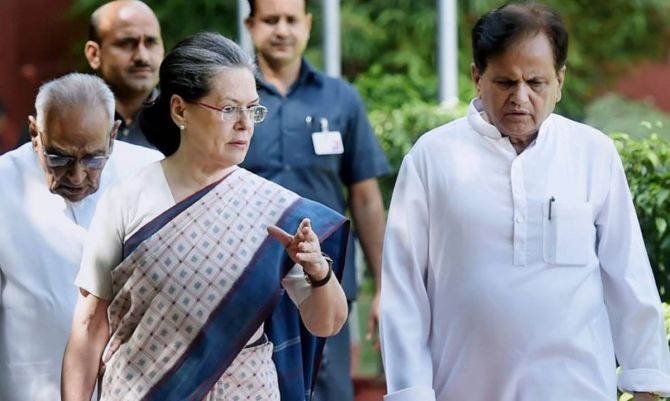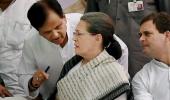Ahmed Patel was the Congress's man for all seasons and every reason, the quintessential backroom strategist who maintained a studied low profile but held a steel-grip over the party's affairs as he helped steer it through the potholed roads of changing political landscapes.

Babubhai and AP to friends and Ahmed Bhai to colleagues, Patel died early Wednesday in a Gurugram hospital where he was admitted with COVID-19, till the very end the staunch Congress loyalist famed for his crisis management skills and also his consensus building abilities that helped him make friends across the spectrum.
The 71-year-old remained Sonia Gandhi's most trusted lieutenant for most of her tenure as the longest serving Congress president, standing by her side through sun and shade.
She described him as a leader dedicated to the party and one whose assets of faithfulness, dedication, commitment to duty, willingness to help and generosity distinguished him from others. "I have lost an irreplaceable comrade, a faithful colleague and a friend," she said in her condolence message, voicing her anguish at Patel's departure at a time of acute internal friction in the Congress.
Just three months ago, in August, Patel stepped in to quell a rebellion. His firm rejection of the public stand taken by 23 party leaders against Sonia Gandhi helped the Congress Working Committee snub the demand for replacement of a Gandhi as party chief and repose faith in her presidency after she offered to quit.
He was a Rajya Sabha MP from Gujarat and All India Congress Committee treasurer. But was actually so much more. Mild mannered and affable, the rise of Patel from a party worker in Gujarat to its key strategist and troubleshooter was testament to his grit, talent and ideological commitment.
The Congress's most astute politician, who controlled the Congress organisation with a silent yet firmly persuasive style, would often say "no one is indispensable" but everyone in the party knows that "this is just not true".
Even outside the Congress, Patel's legendary political instinct and acuity held him in good stead across parties with politicians across hues falling back on him for political advice. He was key in forging the United Progressive Alliance in 2004.
Patel was forever a votary of internal discussions on matters of concern in the Congress, leading by example and never speaking if he didn't have to.
Patel's importance in the Congress dates back to the days of the late Rajiv Gandhi. When Rajiv Gandhi became prime minister, he did away with the post of principal secretary to the PM which his mother Indira Gandhi had created for PN Haksar and appointed three parliamentary secretaries -- Ahmed Patel, Arun Singh and Oscar Fernandes.
When Sonia Gandhi became party president in April 1998, she appointed Ambika Soni as her first political secretary only to replace her with Patel in 2001. He served in the post till he took his last breath on Wednesday.
He later took charge of the Congress's organisational structure both in Gujarat and at the AICC. Though Patel never became minister, he remained kingmaker, playing a pivotal role in decision making throughout the Congress-led UPA I and UPA II years.
And right through the decades, the eight-time parliamentarian with five terms in the Rajya Sabha and three in the Lok Sabha maintained a low profile, a stark contrast from the archetypal politician scrambling to be in the media spotlight.
Born in August 1949 at Piraman village in Gujarat's Bharuch district, Patel began his political career by contesting the local body polls in Bharuch in 1976. He was first elected to the Lok Sabha from Bharuch at a young age of 28 in 1977. He won the seat again in 1980 and 1984.
Patel was the last Muslim to be elected to the Lok Sabha from Gujarat, part of the Rajiv Gandhi sweep in 1984. A Hindutva surge led to him losing to the BJP when he contested Lok Sabha elections for the fourth time in 1989. He was then elected to the Rajya Sabha in 1993.
He also served as AICC general secretary from September 1985 to January 1986 and May 1992 to October 1996. He was also member of the CWC from April 1992 onwards and the party treasurer from October 1996 to July 2000.
He won his election to the Rajya Sabha from Gujarat against all odds recently. It was a nail-biting finish after some party MLAs allegedly switched sides. The cancellation of the secret vote of a Congress MLA who had made it public clinched the seat for him.
Patel was also AICC treasurer, a leader with complete hold of the Congress's institutional history and a hold on all its power keys.
The kind-hearted 'Babubhai' to his friends, relatives and well-wishers in his home state, Patel was a pivotal figure in Delhi but his influence in his home state did not diminish.
Many Congress leaders in Gujarat would project that they had Patel's 'blessings' and claimed he guided them like a father figure.
Those who knew him in political and media circles in Gujarat said Patel had the ability to charm people with his mild manner and would always make it a point to reach out to people during their good and bad times.
He was also involved in social works in Bharuch district, where he worked to provide medical facilities to people by setting up a big hospital.
Patel had announced on Twitter on October 1 that he had tested positive for COVID-19.
Five days later, on October 6, he posted a condolence message to Chirag Paswan expressing shock at the death of his father Ram Vilas Paswan.
That was possibly his last tweet.
A veteran journalist recalled that before Patel tested COVID-19 positive, he had been regularly calling many people, including mediapersons, in Gujarat to ask about their well-being.











 © 2025
© 2025